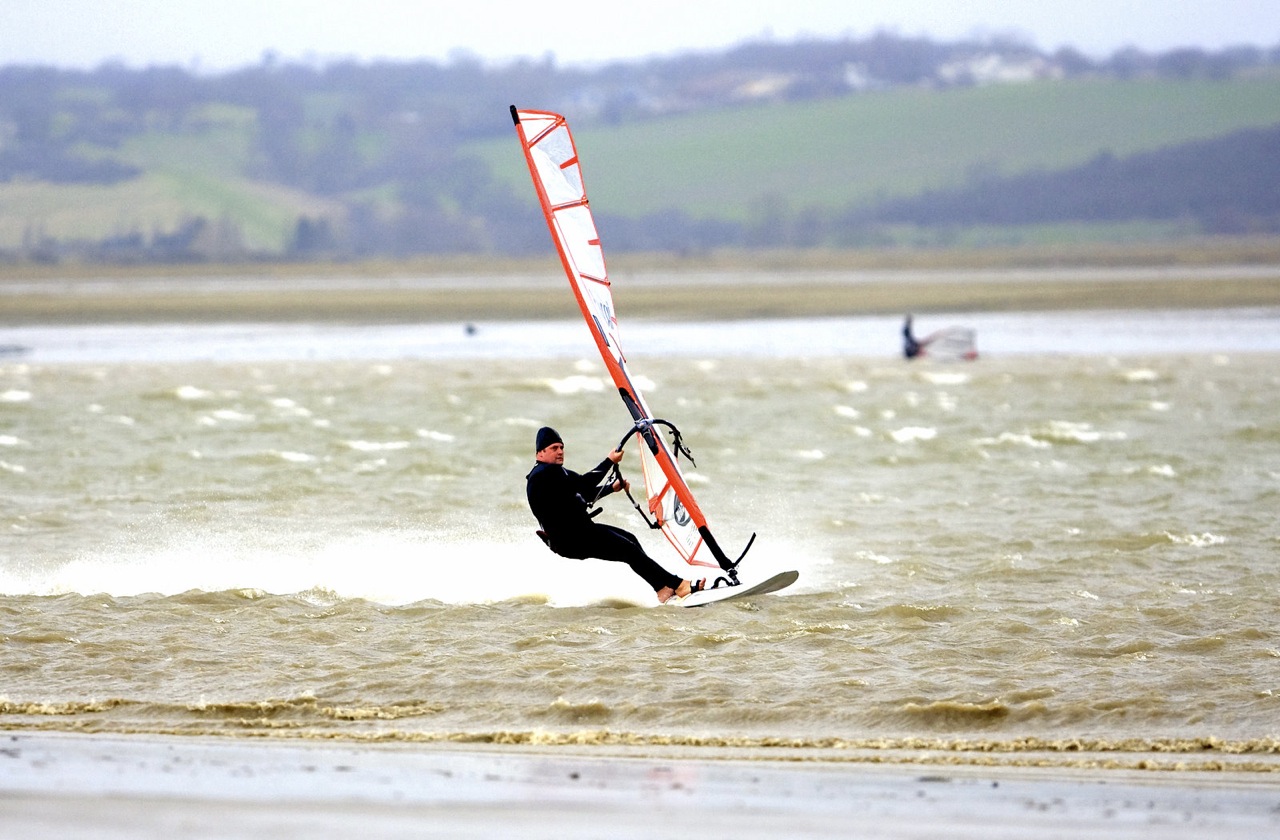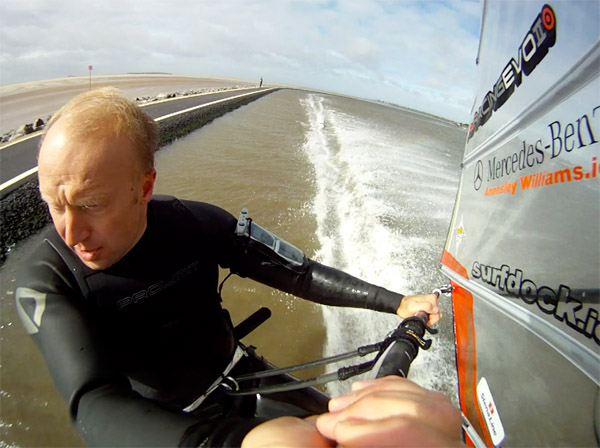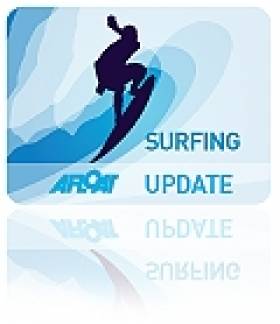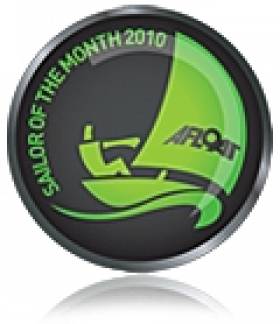Displaying items by tag: John Kenny
Van Gelderen Claims Irish Speed Sailing Title for 2011
#WINDSURFING - Oisín van Gelderen is all but confirmed as Irish Speed Sailing Champion for the second year running.
His national record speed (44.23 knots by 5x10 second average and 43.96 knots over 500m) puts him far ahead of his nearest competition in the rankings.
But his competitive spirit would not let him rest on his laurels.
"Ever since setting that record in February, I have been trying to beat it," he said, "and we had a really good day on Thursday in Dungarvan."
Though he did not beat his averages, he did set a new Irish record for peak speed at 47.89 knots (verification pending).
Van Gelderen dedicated his previous national title win to to the memory of Surfdock founder Alan Harris and Irish 500m speed record holder John Kenny, who both passed away in 2010.
Meanwhile, his Surfdock teammate Noelle Doran has taken the women's title for 2011 with a very impressive set of times for the year.
Her Irish women's peak record of 38.17 knots was complemented by third overall place for 2011 by 5x10 second average and first in the world over 500m.
"I'm so delighted for her," said Van Gelderen. "She had a nasty injury a few years ago, where she dislocated her hip while windsurfing. The resulting nerve damage put a stop to her competing in Waves and Freestyle, where she had multiple national titles."
Van Gelderen Becomes Fastest Sailor on Irish Waters
The Irish GPS Speedsailing record fell again last Friday in Dungarvan when Oisin Van Gelderen broke all previous speeds, becoming the fastest sailor ever to sail on Irish waters.
The speed is ratified by the WGPSSRC (World GPS Speedsailing Records Council):
http://www.gps-speedsurfing.com/default.aspx?mnu=records, who issue GPS records based on the best 10 second run of 45.02 knots, and a distance travelled of around 270 metres in this time.
The 5 x 10second run average, currently puts him in fourth overall on the 2011 GPS speed ranking list and 23rd overall in the all time rankings.
Peak speed for the day was 46.32 knots (84 kmph), and 500m speed was 43.96knots.
Even though Van Gelderen broke the late John Kenny's 500m speed, he retains that title for now, as the WSSRC (World Speed sailing Records Council) issue National records for that distance, and do not yet recognize GPS.
The rise in popularity in GPS speedsailing has made the competition a worldwide phenomenon, as people from different countries compete year round to push their personal and international speeds. Over 4000 members subscribe to the gps-speedsurfing.com website.
Previously our Sailor of the Month in October 2008, when he set a new Irish record in Dungarvan, Kenny was disappointed with his showing in the final series of the Worlds at the same West Waterford venue last autumn. He was in the frame, but not on top.
But then, as the rest of the country subsided into Yuletide torpor, he was back on form, this time in the almost suburban setting of the Burrow Beach at Sutton, where ideal conditions can develop in the inshore stretch of water between Portmarnock Golf Links and Howth Harbour.
Though it's ultimately a case of working with elemental forces of nature, speed sailors on their boards rely on the best technology that can be provided by satellite navigation on GPS. For most folk, GPS is useful for telling you where you are. But for the speed freaks, it can be tweaked to tell you how quickly you went getting there.
Kenny achieved a personal best of a burst of 45.3 knots (84 kph) and averaged 42.52 for the 500 metres. For those of technical bent, he was on a Starboard Isonic Speed Special W49 board, with a Severne Code Red 5.9 sail.
Having shone on the east coast, the New Year has found him on the west coast, in the first event of the 2010 at the popular setting of Elly Bay in Belmullet.
In such pre-set events, you have to make the best of conditions as found, but Kenny was tops with an average of 34.74, three knots clear of the next contender.
But, though 45.3-plus is now the target, for now, the fact that John Kenny has hit that speed under sail power gets the New Year off to a fine start.
Anyone who thinks that they understand what the state of play is in the 33rd America's Cup is under a delusion. After all the legal wrangling over two years, it all comes down to a couple of giant multihulls having three very fast races off Valencia in Spain in a short week in the shortest month of the year.
The first race is on February 8, the second on the 10th and the third on the 12th.
Meanwhile, at the first major regatta of the year -- Key West in Florida -- designer Mark Mills has been scoring well again with one of his Summit 40s (formerly the King 40) winning the main IRC class, while a Mills 43 was third.
In the PHRF Division (for which they were not designed), two of the new Summit 35s took second and fourth, with Dave Dwyer and Anthony O'Leary of Cork taking second with marinercove.ie, and Act One, part-owned by Tom Roche of Dun Laoghaire, taking fourth. Under IRC, they'd have been first and second.
John Kenny RIP
John's funeral took place this morning at St. Patrick's Church, Ringsend. Details HERE. A passionate and true sportsman he pioneered the sport of speed sailing in Ireland.
John is survived by his mother and father Rose and Sean, sister Charlene, Caroline and brother Tony, his partner Linda Balfe and children Conor, Orlagh and Brona.
John was named Irish Independent/Afloat.ie "Sailor of the Month" last January after pushing the bounds of waterborne wind-powered speed in Ireland in winter's big breezes.
Previously Afloat's Sailor of the Month in October 2008 when he set a new Irish record in Dungarvan, Co. Waterford.
He achieved a personal best of a burst of 45.3 knots (it's 84 kph) and averaged 42.52 for the 500 metres to take the Irish Speed sailing record.
On his blog windsurfer Alistair Nichol today said:
"I am still shocked that my good friend John Kenny passed away last week. The next time I turn up to go speed sailing and he will not be there giving me a kick up the arse cause i'm not sailing fast enough and not see him charging down the speed course usually setting the fastest runs of the day is going to be wierd. Whenever i sailed with him he was always pushing me to do better. He lived his life to the full, giving 100% in anything he did and the world will be a much smaller place without him in it and he will be missed by all who had the pleasure to know him. RIP...mate hope your getting 50 knot runs in up there"

John 'JK' Kenny competing at speed in the UK. Photo: Paul O'Riain
Dublin Windsurfer Claims Irish Speed Sailing Record
"I know for sure my Max Speed of 47.17 knots is the fastest any Irish sailor has ever done" he claims.
The current record, approved by the World Speed Sailing Council, was set by John Kenny in February who achieved a personal best of a burst of 45.3 knots (it's 84 kph) and averaged 42.52 for the 500 metres.
Van Gelderen describes the build up to yesterday's record attempt at the UK's West Kirby venue:
"The wind was pretty strong - 30-40 knots, so I rigged my brand new Pryde 4.7m RSRacing - just to get the hang things. As it turned out, this sail was perfect for me all day (I'm not the heaviest speed-sailor at 78 kgs).
I knew my board was already fast, but I'm also delighted with the sail, which was rigged for the first time and performed straight away without any tuning.
Van Gelderen's record breaking tracks are HERE

Oisin Van Gelderen concentrates on a speed sailing record run in West Kirby yesterday, its famous wall in the background

































































